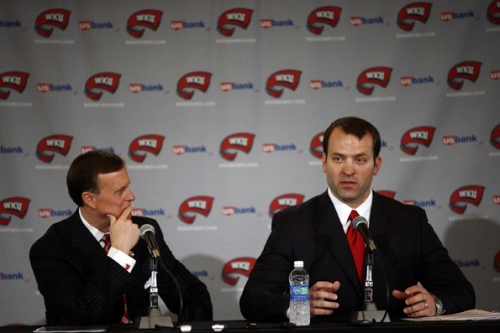AD Bjork talks coaches, attendance, academics
January 19, 2011
WKU Athletics Director Ross Bjork said last week that WKU will continue to deal with the struggles of its basketball programs on a day-to-day basis.
But even if no panic button is ever pressed, Bjork told the Herald Wednesday that evaluation is happening all the time.
“You always make decisions with what is best for the university — that’s the first filter,” Bjork said. “You take everything into consideration, and I don’t think anyone should ever hit a panic button. Now, there’s certain circumstances that may dictate other decisions that have to be made, but in terms of our program, we’ve had 11 coaches in the history of WKU basketball.”
Bjork jokingly acknowledged that E.A. Diddle held the position for more than 40 years, skewing that fact, but he said the standard is always focused first on improvement before changes.
“Two- or three-year cycles happen in our business, so what we have to do is be mindful of what is best for our program moving forward,” Bjork said. “Since Mr. Diddle left, there’s been 10 of those coaches. The average tenure has been shorter. Some guys have moved on to other jobs, some have been let go. There’s been a myriad of factors, so we have to evaluate.
“We know we’re not living up to the standards in recent history or the long-term history, so we have to do the right thing and get better.”
Bjork said the recent struggles of basketball and football haven’t necessarily affected donations or season ticket sales, as both are on pace to match recent marks.
“People have stayed with us,” he said. “They see the progress happening in football. Of course, they’re disappointed in basketball, but we sold a lot of season tickets. We had 4,400 season tickets on the men’s side, which was up from last year. If there are down times, we’re engaging people at a higher level in the hopes that they stay with us and have patience.”
Attendance woes
One number that hasn’t stayed on pace is basketball attendance, which has hit a slide with both programs.
The dip has been much more evident for the Lady Toppers, who are now averaging 861 fans per home game.
The women have drawn 1,000 fans just once since the first two exhibition games, bringing in 1,004 for Texas Tech. No Lady Topper home game drew less than 1,000 fans last season.
Bjork said the same amount of season tickets were sold for the Lady Toppers this season as last year, but that people simply aren’t showing up.
“Women’s basketball attendance — the demographic of that crowd is typically older,” Bjork said. “Those people may not be able to come to games any longer, so you start losing those fans. What we have to do is grow younger fans, get families involved, get kids involved and do things to bring people to our games.”
In order to fight a lack of young fans and disappointing on-court results, Bjork said WKU is trying several initiatives to generate interest.
The Lady Toppers will host more than 5,000 students from Warren County for an “Education Day” game on Feb. 2, and student-athletes recently went out to local restaurants to hand out tickets to customers at lunchtime.
Bjork said the school can’t advertise handing out tickets per NCAA rules, but WKU can track the results of that exercise, and they’ve been positive.
He said it takes those kinds of efforts when people expect a solid return on a financial investment, and that includes purchasing a game ticket.
“That means wins on the court,” Bjork said. “Right now, we’re not delivering on that. Again, we have to get better, but we’re trying to do some unique things.”
Academics on the rise despite specific incidents
Bjork also announced for the first time Wednesday that the average grade point average for WKU’s student-athletes during the fall semester was 2.94, the highest on record.
The cumulative GPA of the current student-athletes during their total time at the school is 3.0, which is also a record-high.
However, the fall semester was overshadowed by two incidents within the men’s basketball program involving guards Ken Brown and Brandon Peters.
Brown, a junior-college transfer, was dismissed from the program on Dec. 11 for a violation of academic policy, and the freshman Peters was ruled academically ineligible for the rest of the season on Jan. 1.
“The first responsibility is with the student-athlete,” Bjork said. “The second responsibility is with the coach, and the coach that recruited that athlete. Did we study enough about his academic record or her academic record? It goes back to recruiting, and it goes back to the support once they’re here. Are we providing the right environment?”
Bjork told the Herald several weeks ago that Peters was ruled ineligible by the NCAA’s standards, not WKU’s. He said Peters received all of the support services athletes typically get, but that his case was one unfortunate incident out of about 400 student-athletes.
“We were servicing Brandon,” Bjork said. “We were helping him all the way through, and sometimes things just happen. Brandon tried, but in the end, it just didn’t come together. I think all students face that.”













